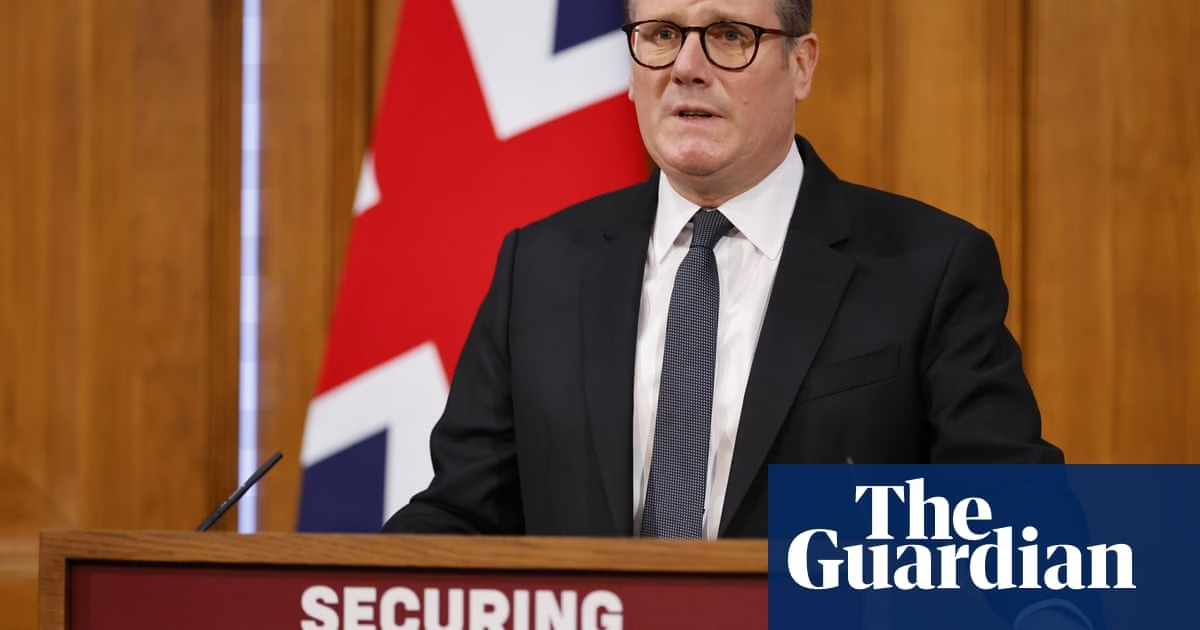<
div>
Good morning. On Monday, Keir Starmer added his name to the dubious list of prime ministers who have used very forceful language to describe the impact of migration on the UK. The UK is at risk of becoming an “island of strangers, not a nation that walks forward together”, he said; the system “seems almost designed to permit abuse”. But while the tone echoed much of the rhetoric of the last 20 years, Starmer insisted he was doing something different.
In his speech launching the government’s immigration white paper, he accused the Conservatives of a “one-nation experiment in open borders conducted on a country that voted for control”, and said that “the experiment is over”. He also claimed that his approach was not about politics. But with Reform UK on the march, this looks thoroughly political. And even to some of his own backbenchers, his approach looks very likely to fuel racism.
The Guardian has lots of coverage of Starmer’s announcement, including a policy rundown, a guide to the sectors most affected by the proposed changes, and Pippa Crerar’s analysis. Today’s newsletter situates all of that in the repetitive and unproductive history of the immigration debate over the last two decades – and the question of whether Starmer can really expect a different outcome this time. Here are the headlines.
Five big stories
- Middle East | Gaza is at “critical risk of famine”, food security experts have warned, 10 weeks after Israel imposed a blockade. The Integrated Food Security Phase Classification (IPC) said there had been a major deterioration in the food security situation facing Palestinians living there since its last assessment in October 2024.
- Security | Counter-terrorism police are investigating after two properties linked to Keir Starmer were hit by suspected arson attacks. A blaze broke out at a home owned by Starmer in Kentish Town, London in the early hours of Monday morning, following two other fires within the last week.
- Trump administration | The first group of white South Africans granted refugee status by Donald Trump’s administration has arrived in the US, stirring controversy in South Africa as the US president declared the Afrikaners victims of a “genocide”. On the same day, Trump’s government ended legal protections that had temporarily protected Afghans from deportation.
- Armed forces | Former UK special forces personnel have accused colleagues of committing war crimes in Iraq and Afghanistan, including alleging that they executed civilians and a child. Graphic accounts of routine executions of handcuffed prisoners were handed to the BBC, which reported that weapons were planted during cover-ups.
- Crime | Six Bulgarians convicted of spying for Russia in Britain have been jailed at the Old Bailey. The ringleader, Orlin Roussev, was sentenced to 10 years and eight months for his role in executing six “sophisticated” operations that risked national security and the safety of the public.
In depth: From incendiary slogans to failed methods – two decades of rules and rhetoric
In 2006, Tony Blair said that the rational response to globalisation was to “manage it, prepare for it, and roll with it” – but that “for the first time … a mindset of fear that is different and deep” was emerging. Meanwhile, the accession of eight eastern European countries to the EU saw about 1.3 million people arriving in the UK over five years. That set the stage for two decades of forceful and sometimes incendiary rhetoric on immigration that was accompanied by a steady, and then sudden, increase in overall numbers.
2008 | Net migration: 229,000
Gordon Brown’s government introduced a points-based system – first set out in a 2005 strategy document – for people coming to the UK from outside the EU. Immigration minister Liam Byrne said that “people want to know that only those who we need to come to Britain should be allowed to come”.
2010 | Net migration: 256,000
David Cameron promised voters that they would reduce net migration below 100,000. His intervention raised the statistic as a metric of government success in managing migration for the first time. Cameron said: “I don’t think that’s unrealistic; that’s the sort of figure there was in the 1990s, and I think we should see that again.”
After entering government in coalition with the Liberal Democrats, the Conservatives swiftly closed the Tier 1 visa route, for highly skilled workers without a job offer, with a new focus instead on “investors and entrepreneurs”. They also introduced the first ever cap on total work visas, increased salary requirements, created new eligibility requirements for the points-based system, and introduced new English language requirements for those on spousal visas. All of these changes applied only to prospective immigrants from outside the EU, with no impact on the much larger proportion of the overall numbers coming from Europe.
2012 | Net migration: 195,000
As home secretary, Theresa May introduced the “hostile environment” approach, which was billed as focused on “illegal migration” but swiftly came to represent the government’s attitude to immigration in general. It mandated immigration status checks by doctors, landlords and others and came alongside the infamous “go home” billboard vans. The government also abolished post-study work visas for foreign students.
The most shocking example of the consequences of the approach came in the Windrush scandal, which broke in 2018. It saw thousands of people, mostly from Caribbean countries wrongly classified as illegal immigrants and detained, denied rights, threatened with deportation and even forced to leave the UK (pictured above, a Windrush solidarity rally).
There is no evidence that the strategy reduced legal or illegal migration numbers, and voluntary returns – a reasonable measure of the success of a policy aimed at persuading people to leave the country of their own accord – actually fell by two-thirds between 2013 and 2019.
2015 | Net migration: 333,000
With a European refugee crisis under way as a result of conflict in the Middle East, the Conservatives’ manifesto for the next election retained the “ambition” of reducing net migration to the tens of thousands. Meanwhile, under pressure from Ukip on the right, the Conservatives also promised an in/out referendum on EU membership. As you may remember, the Vote Leave campaign the next year repeatedly suggested that only Brexit could make the tens of thousands target achievable.
2017 | Net migration: 208,000
Theresa May’s manifesto again retained the tens of thousands pledge; May said that leaving the European Union “enables us to control our borders in relation to people coming from the EU, as well as those who are coming from outside”. With the flow of immigrants from the EU sharply declining and a spike in arrivals from the rest of the world not yet in full swing, the net migration number temporarily dropped.
2019 | Net migration: 184,000
Amid significant shortages of workers in social care and agriculture, among other sectors, Boris Johnson dropped the tens of thousands pledge, and introduced an “Australian-style points-based system”. He drew a distinction between “unskilled immigrants” coming from the EU and the need to “be much more open to high-skilled immigration”. The Home Office claimed that the new system would reduce unskilled EU migration by 90,000, but increase skilled migration by 65,000 a year. It swiftly stopped using that figure, which appeared to have no substantial basis.
2020 | Net migration: 94,000
With severe labour shortages as a result of the end to free movement now biting, particularly in social care, the government launched a new health and care visa. Thresholds on salaries and skills were reduced, and the following year, with empty shelves in supermarkets and fuel delivery shortages, seasonal visas for poultry workers and HGV drivers were increased to “save Christmas”. The government also reintroduced the post-study work visa abolished when Theresa May was home secretary.
2023 | Net migration: 906,000
With net migration at its highest-ever level, some 807,000 above the Cameron government’s defunct target, Rishi Sunak’s government now set out plans to increase the salary threshold for workers to bring family to the UK from £18,600 to £38,700. But much of the rhetoric – particularly on the Rwanda scheme – continued to centre around illegal migration and Channel crossings, a vastly smaller contributor to total arrivals.
after newsletter promotion
2025 | Net migration (last year): 728,000
Keir Starmer’s government promises to raise the level of qualification needed to secure a skilled work visa; end all overseas recruitment for social care work after a transition period; require all adult dependents coming to the UK to demonstrate basic English skills; tighten up assessments of institutions granting student visas; and make people wait longer to seek permanent settlement in the UK. (Peter Walker has a full rundown here). Starmer insists that this will lead to a significant fall in overall numbers by the end of this parliament. But mindful of the history of bold claims and reversals by previous governments, he declines to set an overall target.
Figures are drawn from a Migration Observatory briefing in December 2024, using International Passenger Survey-based ONS data until 2010, and Office for National Statistics experimental data thereafter. All figures are estimates with substantial uncertainty, the Migration Observatory notes.
What else we’ve been reading
<
ul class=”dcr-16w5gq9″>
Zack Polanski is standing for leader of the Green party. Could his brand of “eco-populism” prove to be electoral dynamite? He talks about his colourful life (including a headline-making stint as a hypnotherapist), and why oligarchy is the problem. Alex Needham, acting head of newsletters
Settle in with Hettie O’Brien’s riveting long read about Stephen David Jones, a thoroughly plausible lawyer with impeccable credentials whose wealthy clients started to suspect that something was amiss – and whose story has all kinds of wider resonances that will stay with you. Archie
The Cannes film festival kicks off today, including the premiere of A Pale View of Hills, an adaptation of Kazuo Ishiguro’s first novel. The Nobel prize-winner divulges his secret desire to Xan Brooks: for his stories to prove as durable as Homer’s. Alex
<
p class=”dcr-16w5gq9″>A picture of a terribly emaciated six-month old, Siwar Ashour, has swiftly become a symbol of the impact of Israel’s total blockade of Gaza. Malak A Tantesh and
Source: https://www.theguardian.com/world/2025/may/13/tuesday-briefing-first-edition-keir-starmer-immigration






